During the current funding cycle, we have recruited established investigators and have mentored early-stage investigators at USC. Specifically, over the past year, the ADRC has recruited to its core leadership:
During the current funding cycle, we have recruited established investigators and have mentored early-stage investigators at USC. Specifically, over the past year, the ADRC has recruited to its core leadership:
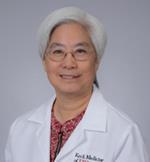
Core Lead
Dr. Chui is the Raymond and Betty McCarron Professor of Neurology at the Keck School of Medicine. She has served as Chair of the Department of Neurology and Director of the USC Alzheimer Disease Research Center since 2003. Dr. Chui earned her B.A. in Chemistry and M.D. at Johns Hopkins University. She completed her residency training in neurology and fellowship in behavioral neurology at the University of Iowa in 1981.
Dr. Chui is internationally recognized for her research in Alzheimer disease and vascular cognitive impairment. She is the author of more than 250 peer-reviewed publications and 40 book chapters/review articles. She is currently funded by the National Institutes on Aging for studies of neurovascular health, using physiological measures of vasoreactivity, stiffness, pulsatility, and morphological characteristics of the cerebrovascular tree.
CHP 215 Health Sciences Campus Los Angeles CA 90089-9207
(323) 442-7686
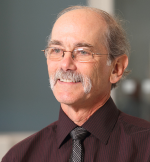
Co-Core Lead
Arthur W. Toga, Ph.D., is Provost Professor of Ophthalmology, Neurology, Psychiatry and the Behavioral Sciences, Radiology and Biomedical Engineering, and Director of the USC Mark and Mary Stevens Institute of Neuroimaging and Informatics.
Dr. Toga’s research focuses on neurodegenerative disease, specifically Alzheimer’s disease. He has pioneered some of the most widely used informatics systems in the world (e.g., IDA and GAAIN), supporting more than 150 multisite trials in AD and other neurological diseases and psychiatric disorders. His interdisciplinary work led to the creation of the Laboratory of Neuro Imaging (LONI), which he also directs and is one of the most advanced multidisciplinary neurological research centers. Funded by the National Institutes of Health (NIH), the Alzheimer’s Association, the Michael J Fox Foundation among others, as well as industry partners, LONI houses one of the largest computing facilities dedicated to the field and one of the largest brain image repositories in the world.
He is an author or co-author of more than 950 peer-reviewed papers, 1100 abstracts and 80 book chapters or books, among them Brain Mapping: The Methods. He is the founding editor of the journal NeuroImage. Dr. Toga has received numerous awards for his research and teaching, including the Pioneer in Medicine Award, Smithsonian Award for Scientific Innovation and Giovanni DiChiro Award for Outstanding Scientific Research. He holds the Ghada Irani chair in Neuroscience and has been one of the world’s top researchers on the AD Scientific Index, Top 200 Best Scientists in Neuroscience on Research.com, and listed as one of Thomson Reuters' and Clarivate Highly Cited Researchers for many years.
SHN 2025 Zonal Avenue Health Sciences Campus Los Angeles CA 90033
(323) 442-7246
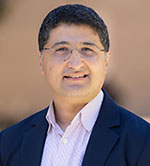
Core Lead
Dr. Hussein Yassine, professor at the Keck School of Medicine of USC, holds the Kenneth and Bette Volk Endowed Chair of Neurology. Dr. Yassine’s lab works on understanding how changes in brain lipid metabolism predispose individuals to develop Alzheimer’s disease (AD) pathology with a focus on how APOE affects brain lipid metabolism. Yassine is also the Director of the Center for Personalized Brain Health (CPBH), dedicated to patients carrying the APOE4 allele. The CPBH represents a crucial translational bridge between basic and clinical neuroscience that focuses on understanding and mitigating the adverse effects of APOE4 on brain health. Dr. Yassine collaborates with experts across multiple fields to drive progress in early detection and treatment strategies, contributing significantly to our collective mission to address Alzheimer’s disease.
ZNI 323, 1501 San Pablo St, Los Angeles, CA 90033
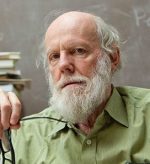
Dr. Finch is ARCO/William F. Kieschnick Chair in the Neurobiology of Aging and University Professor of Gerontology and Neurology. He was the founding Principal Investigator of the USC/ADRC for 20 years (1984 to 2003). He transitioned the Directorship to Dr. Chui in 2003, but has remained vitally active as the Founding Director of the ADRC as well as the founding director of the University-wide AirPolBrain Project. Dr. Finch has an encyclopedic range of expertise, in the field of aging, evolution, and longevity. His technical expertise includes molecular biology, cell biology, neuroendocrinology, histopathology, and gross pathology. As Founding Director for the ADRC and Chair of the Internal Advisory Committee, he will continue to provide his scientific leadership and strategic guidance.
(213) 740-1758
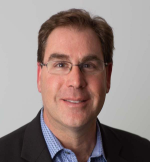
Core Lead
Dr. Rissman is Professor Physiology and Neuroscience and the W.M. Keck Endowed Professor in Medicine. He is the founding Director of the Neuroscience Translational Research Division and the ATRI Biomarker Laboratory and Biorepository. He is the Alzheimer’s Clinical Trials Consortium (ACTC) Biorepository Unit Lead.
The goal of Dr. Rissman’s basic science research is on novel biomarker discovery in Alzheimer’s Disease (AD) and preclinical studies in experimental. A major focus of his lab in AD biomarkers is on the utility and mechanistic underpinnings of neuronal exosomes and his group has published manuscripts demonstrating the ability of tau and abeta in neuronal exosomes to predict conversion from MCI to AD. The lab also investigates the contribution of stress and changes in stress signaling intermediates in Alzheimer’s disease neuropathology. Using transgenic mice and in vivo pharmacology, experiments are focused on identifying the role of corticotropin-releasing factor (CRF) receptors in beta-amyloid deposition, tau phosphorylation and behavioral and synaptic changes.
1501 San Pablo St., Health Sciences Campus Los Angeles CA 90033

Core Lead
Lon Schneider is internationally recognized in clinical drug development for Alzheimer's disease and cognitive disorders, neuropsychiatric, and behavioral disorders, has led numerous clinical trials for AD and MCI therapeutics, consults with numerous development programs, participated in the design and operations of several early and later phase proprietary development programs for AD, directed multicenter trials in AD and major depression, including the paradigm shifting CATIE-AD trial. More recently, he examined evidence for secular changes in AD trials characteristics and outcomes, and is conducting work using trials simulations from large metadatabases to assess the effects of Alzheimer's-related biomarkers and genotypes on the efficiency of targeted clinical trials in order to improve trials methods. He serves on the steering committees of the NIH ADCS, the NIH ADNI, and the Banner Alzheimer's Prevention Initiative.
CHP-216 1540 Alcazar Street, Health Sciences Campus, Los Angeles CA 90089-9009
(323) 442-7600
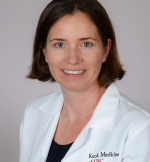
Co-Core Lead
Elizabeth Joe, M.D., is a behavioral neurologist at USC's Memory and Aging Center and Alzheimer Disease Research Center, where she sees people with memory disorders for clinical care and research assessments. She also co-leads the USC CSF Diversion Center for care of patients with normal pressure hydrocephalus. Her research interests are related to improving the healthcare system for people with dementia and their caregivers. She developed and led a shared medical appointments program for memory care and is piloting a similar program for patients with neurologic disorders within the Los Angeles County Department of Health Services. She completed medical school at Tufts University School of Medicine and her neurology residency and fellowship training at USC.
1520 San Pablo St. Health Sciences Campus Los Angeles CA 90033
(323) 442-5710
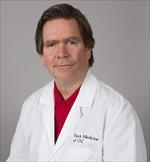
Dr. Ringman is Clinical Professor of Neurology at the Memory and Aging Center at the Keck School of Medicine of USC. He received his Bachelor’s degree in Psychology and Neurobiology at U.C. Berkeley before going to medical school at McGill University, and doing his internship and residency at Baylor College of Medicine in Houston. He then came to Los Angeles to pursue subspecialty training in behavioral neurology and dementia. His current activities include performing studies of persons with or destined to develop familial Alzheimer's disease due to known genetic mutations, clinical research in late-onset Alzheimer's disease in association with the USC Alzheimer's Disease Research Center, and seeing patients with cognitive or behavioral problems referable to neurological and in particular, neurodegenerative disease.
CHP 210 1540 Alcazar St.Health Sciences Campus, Los Angeles CA 90033
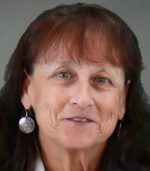
Dr. Segal-Gidan is Associate Professor of Clinical Neurology and Director of the CADC at RLNRC (CADC-Rancho). She is a licensed Physician Associate, PA, holds a doctoral degree in Health Policy, and was a former Leader of the ADRC ORE Core. The CADC-Rancho is a portal for our Plan to Enhance Diverse Perspectives (PEDPDHS), where we envision DHS patients with memory concerns from URG (especially Latinx) will be invited to participate in research studies at the ADRC, She will work closely with colleagues at other DHS facilities (e.g Heather Schickedanz MD, Chair Family Medicine, Harbor UCLA), Clinical Core [Dr. Joe, Clinical Coordinator, and psychometrician] and ORE Core [Aranda, Ringman and Towfighi].
OCH Rlm, Health Sciences Campus, Los Angeles CA 90089
(562) 401-8130
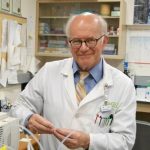
Dr. Harrington is a Professor of Research in Neurology at the University of Southern California (USC). He is a senior NIH-funded neuroscientist with expertise in disease pathophysiology and biomarker studies. He assists with the standardized completion of the UDSv4.
1510 San Pablo St., Health Sciences Campus, Los Angeles CA 90033
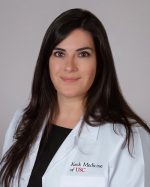
Dr. D’Orazio is an Assistant Professor of Clinical Neurology who is a bilingual (English and Spanish) and bicultural licensed. clinical neuropsychologist who currently performs, oversees, and guides Spanish- and English-language cognitive assessments at the USC ADRC. Dr. D’Orazio ensures that the Spanish language cognitive testing is performed as per protocol and is responsible for ongoing scoring, quality control, and interpretation of these tests. Dr. D’Orazio is also involved with the selection and training of all graduate student testers as well as psychometricians hired as staff. She is particularly qualified to recruit, select and train Spanish speaking and underrepresented testers.
1520 San Pablo St., Health Sciences Campus, Los Angeles CA 90033
(323) 422-5710
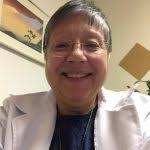
Dr. Pawluczyk is a geriatric psychiatrist, assistant professor of psychiatry, bilingual Spanish, who has worked in the field of dementia for the over 30 years. She has worked with Dr. Schneider in the pharmacology program during this time and has a major role in the operation of the clinical core and in affiliated studies supported by the ADRC. As a senior clinician, she is responsible for assessing participant eligibility for the clinical core, general research pool, clinical trials, and external requests for participant resources. As part of the evaluation she completes all research documentation, including the UDSv4 in collaboration with the Senior Research Nurse and the UDS Coordinator. She is responsible for ensuring quality patient care.
HCT 3000 1520 San Pablo Street, Health Sciences Campus, Los Angeles CA 90089-9409
(323) 422-7600

Core Lead
Arthur W. Toga, Ph.D., is Provost Professor of Ophthalmology, Neurology, Psychiatry and the Behavioral Sciences, Radiology and Biomedical Engineering, and Director of the USC Mark and Mary Stevens Institute of Neuroimaging and Informatics.
Dr. Toga’s research focuses on neurodegenerative disease, specifically Alzheimer’s disease. He has pioneered some of the most widely used informatics systems in the world (e.g., IDA and GAAIN), supporting more than 150 multisite trials in AD and other neurological diseases and psychiatric disorders. His interdisciplinary work led to the creation of the Laboratory of Neuro Imaging (LONI), which he also directs and is one of the most advanced multidisciplinary neurological research centers. Funded by the National Institutes of Health (NIH), the Alzheimer’s Association, the Michael J Fox Foundation among others, as well as industry partners, LONI houses one of the largest computing facilities dedicated to the field and one of the largest brain image repositories in the world.
He is an author or co-author of more than 950 peer-reviewed papers, 1100 abstracts and 80 book chapters or books, among them Brain Mapping: The Methods. He is the founding editor of the journal NeuroImage. Dr. Toga has received numerous awards for his research and teaching, including the Pioneer in Medicine Award, Smithsonian Award for Scientific Innovation and Giovanni DiChiro Award for Outstanding Scientific Research. He holds the Ghada Irani chair in Neuroscience and has been one of the world’s top researchers on the AD Scientific Index, Top 200 Best Scientists in Neuroscience on Research.com, and listed as one of Thomson Reuters' and Clarivate Highly Cited Researchers for many years.
SHN 2025 Zonal Avenue Health Sciences Campus Los Angeles CA 90033
(323) 442-7246
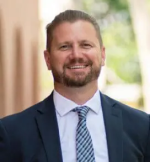
Daniel Nation received his doctorate in Clinical Health Psychology from the University of Miami in 2009, where his dissertation work focused on the effect of oxytocin on atherosclerosis in apoE knockout mice. He went on to complete his clinical internship in Neuropsychology at the University of California San Diego (UCSD)/VA San Diego Healthcare System, and stayed in the UCSD/VA system for an NIH-funded T32 postdoctoral fellowship in Biological Psychiatry and Neuroscience. His research is focused on vascular risk factors and biomarkers of cognitive impairment and Alzheimer’s disease, including markers of cerebrovascular dysfunction, blood-brain barrier breakdown and endothelial progenitor cell depletion.
GER 226A, University Park Campus, Los Angeles CA 90089
(213) 740-2219
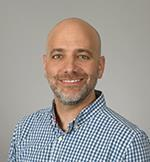
Dr. Conti is a Professor in the Division of Biostatistics in the Department of Population and Public Health Sciences and the University of Southern California. He is also the Kenneth T. Norris, Jr. Chair in Cancer Prevention and Associate Director for Data Science at the USC Norris Comprehensive Cancer Center.
SSB 202 2001 N. Soto Street, Health Sciences Campus Los Angeles CA 90033
(323) 442-3140

Core Lead
Arthur W. Toga, Ph.D., is Provost Professor of Ophthalmology, Neurology, Psychiatry and the Behavioral Sciences, Radiology and Biomedical Engineering, and Director of the USC Mark and Mary Stevens Institute of Neuroimaging and Informatics.
Dr. Toga’s research focuses on neurodegenerative disease, specifically Alzheimer’s disease. He has pioneered some of the most widely used informatics systems in the world (e.g., IDA and GAAIN), supporting more than 150 multisite trials in AD and other neurological diseases and psychiatric disorders. His interdisciplinary work led to the creation of the Laboratory of Neuro Imaging (LONI), which he also directs and is one of the most advanced multidisciplinary neurological research centers. Funded by the National Institutes of Health (NIH), the Alzheimer’s Association, the Michael J Fox Foundation among others, as well as industry partners, LONI houses one of the largest computing facilities dedicated to the field and one of the largest brain image repositories in the world.
He is an author or co-author of more than 950 peer-reviewed papers, 1100 abstracts and 80 book chapters or books, among them Brain Mapping: The Methods. He is the founding editor of the journal NeuroImage. Dr. Toga has received numerous awards for his research and teaching, including the Pioneer in Medicine Award, Smithsonian Award for Scientific Innovation and Giovanni DiChiro Award for Outstanding Scientific Research. He holds the Ghada Irani chair in Neuroscience and has been one of the world’s top researchers on the AD Scientific Index, Top 200 Best Scientists in Neuroscience on Research.com, and listed as one of Thomson Reuters' and Clarivate Highly Cited Researchers for many years.
SHN 2025 Zonal Avenue Health Sciences Campus Los Angeles CA 90033
(323) 442-7246
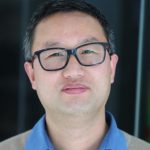
Dr. Shi is an Associate Professor of Neurology and Electrical Engineering at the Stevens Neuroimaging and Informatics Institute at the Keck School of Medicine of USC. His research focuses on the development of novel mathematical frameworks and algorithms in mapping neuroanatomical structures and function. He has extensive experience in analysis methods for diffusion imaging data as well as mathematical models for vessel segmentation. He will apply his novel algorithms to analyze brain connectivity using the multi-shell diffusion imaging data collected in this project and vessel integrity using the obtained MRI modalities.
SHN 2025 Zonal Avenue Health Sciences Campus Los Angeles CA 90033
(323) 442-7246
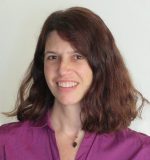
Dr. Meredith Braskie is an Assistant Professor at the University of Southern California. She will perform analyses the MRI data and will help to interpret the MRI findings in the context of this project. She also will be responsible for overseeing data flow and analyses related to grant aims. She will oversee and edit drafts of the MRI analysis-related methods sections for manuscripts. Dr. Braskie has an outstanding track record of publications in neuroimaging, with work on structural MRI (including high resolution hippocampal focuses analyses), functional MRI, diffusion tensor imaging (DTI), and PET analyses. Her research focus is Alzheimer’s disease (AD) and cognitive aging.
ISI, 4676 Admiralty Way, Ste. 200 Health Sciences Campus Marina Del Rey, CA 90292
(323) 442-7246
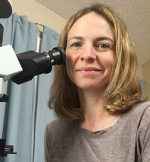
Core Lead
Annie Hiniker, M.D., Ph.D., is Associate Professor of Pathology at the Keck School of Medicine, University of Southern California (USC) and Director of the USC Alzheimer’s Disease Research Center (ADRC) Neuropathology Core. Dr. Hiniker’s research leverages classical neuropathology combined with cell biology, omics, and seeding assays to define the molecular mechanisms of Alzheimer’s Disease, Parkinson’s Disease and other neurodegenerative diseases, with particular emphasis on LRRK2-mediated neurodegeneration. Dr. Hiniker was AOA at University of Michigan where she completed her MD and PhD; she did residency and fellowship in Anatomic Pathology and Neuropathology at UCSF. Prior to her recruitment to USC in 2024, she was Assistant Professor and Co-Director of the ADRC Neuropathology Core at UCSD. Current and past funding sources include NINDS, the Epstein Family Foundation, AFAR Paul B. Beeson Award, Congressionally Directed Medical Research Program Parkinson’s Disease Early Investigator Award, the Alzheimer’s Association, and the American Parkinson’s Disease Association. She has been a member of the American Association of Neuropathologists since 2010, is a co-director of the AANP Neurodegenerative Scholars R13 program, serves on the AANP Education Committee, and is a member of the Editorial Board of Free Neuropathology.
2011 Zonal Ave. Health Sciences Campus, Los Angeles CA 90033
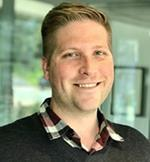
Dr. Bienkowski is interested in characterizing brain cell types and understanding their susceptibility to neurodegenerative diseases like Alhzeimer's disease and retinal degenerative diseases. His translational research laboratory (USC Center for Integrative Connectomics) uses state-of-the-art connectomics and transcriptomics approaches to investigate cell type-specific progressive changes to gene expression and connectivity in rodent and human brain tissue. A major goal of the lab is to build translational cell type atlases to guide clinical drug development and enhance the effectiveness of treatment plans at progressive disease stages.
ZNI, 1501 San Pablo St. Health Sciences Campus, Los Angeles CA 90033
(323) 442-7246
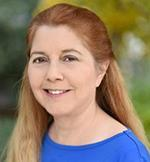
Dr. Hawes began her education by pursuing a certificate in vocational nursing from Santa Ana College followed by a BA degree in French from Cal State Fullerton. She then attended medical school, and upon graduation she was first introduced to the Keck School of Medicine as a resident in the pathology department at LAC+USC Medical Center. While in medical school, Dr. Hawes demonstrated a profound aptitude for her studies when she was awarded to the Dean’s List of Outstanding Achievement in the Basic Sciences. Currently, Dr. Hawes is an assistant professor of clinical pathology and an instructor of the Pathology Multidisciplinary Laboratories at USC. She has reviewed manuscripts for the several medical journals, including the prestigious New England Journal of Medicine. In addition to her vast academic and clinical responsibilities, Dr. Hawes has a number of research interests, such as cancer prevention, new technology development and biologic markers of disease progression. Dr. Hawes has co-authored nearly 30 peer-reviewed journal articles and a number of book chapters and abstracts.
CHL 4650 Sunset Blvd Off Campus, Los Angeles CA 90027
(323) 442-1156
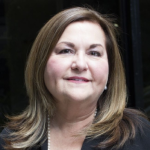
Core Lead
Maria P. Aranda, PhD, is an Associate Professor at the USC Suzanne Dworak-Peck School of Social Work and Executive Director of the USC Edward R. Roybal Institute on Aging. Her research focuses on psychosocial care for adults and older adults with psychiatric disorders, including depression and Alzheimer’s disease. Dr. Aranda’s work explores disparities in health services and develops interventions to alleviate the burdens faced by individuals with medical and psychiatric conditions, as well as their caregivers. She has led several studies funded by agencies such as the National Institutes of Health, the Alzheimer’s Association, and the National Institute of Mental Health.
Dr. Aranda co-founded “El Portal,” a family support program for low-income, Spanish-speaking families managing neurodegenerative disorders, which has become a national model. She has served on numerous boards and committees focused on enhancing practice, policy, and research for underrepresented populations, including consensus committees of the National Academy of Medicine on family caregiving, functional assessments, and mental health service delivery.
2011 Zonal Ave. Health Sciences Campus, Los Angeles CA 90033

Co-Core Lead
Dr. Ringman is Clinical Professor of Neurology at the Memory and Aging Center at the Keck School of Medicine of USC. He received his Bachelor’s degree in Psychology and Neurobiology at U.C. Berkeley before going to medical school at McGill University, and doing his internship and residency at Baylor College of Medicine in Houston. He then came to Los Angeles to pursue subspecialty training in behavioral neurology and dementia. His current activities include performing studies of persons with or destined to develop familial Alzheimer's disease due to known genetic mutations, clinical research in late-onset Alzheimer's disease in association with the USC Alzheimer's Disease Research Center, and seeing patients with cognitive or behavioral problems referable to neurological and in particular, neurodegenerative disease.
CHP 210 1540 Alcazar St.Health Sciences Campus, Los Angeles CA 90033
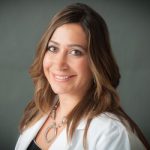
Dr. Towfighi is the Associate Chair for USC Department of Neurology and the Director of Neurological Services for the Los Angeles County (LAC) Department of Health Services (DHS) and Chief of Neurology at the Los Angeles General Medical Center. In her role as Chief of Neurological Services for LAG, she will support the ORE Core’s plan to enhance diverse perspectives (Specific Aim #2) and facilitate forward an increased partnership with the USC ADRC and support efforts to streamline the appropriate recruitment of DHS patients for potential research participation.
(323) 442-5710

Core Lead
Dr. Hussein Yassine, professor at the Keck School of Medicine of USC, holds the Kenneth and Bette Volk Endowed Chair of Neurology. Dr. Yassine’s lab works on understanding how changes in brain lipid metabolism predispose individuals to develop Alzheimer’s disease (AD) pathology with a focus on how APOE affects brain lipid metabolism. Yassine is also the Director of the Center for Personalized Brain Health (CPBH), dedicated to patients carrying the APOE4 allele. The CPBH represents a crucial translational bridge between basic and clinical neuroscience that focuses on understanding and mitigating the adverse effects of APOE4 on brain health. Dr. Yassine collaborates with experts across multiple fields to drive progress in early detection and treatment strategies, contributing significantly to our collective mission to address Alzheimer’s disease.
ZNI 323, 1501 San Pablo St, Los Angeles, CA 90033
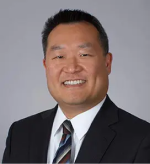
Co-Core Lead
Duke Han, PhD, is a board-certified clinical neuropsychologist and a tenured Professor of Psychology, Family Medicine, Neurology, and Gerontology at the University of Southern California. He earned his BS in Psychology with a specialization in Neuroscience from Duke University and his PhD in Clinical Psychology from the University of Massachusetts Boston. He trained in neuropsychology and neuroimaging at Harvard Medical School and the University of California San Diego (UCSD). Dr. Han’s research focuses on factors affecting cognition and decision-making in aging. He directs a federally funded research lab and serves as Co-Leader of the Research and Education Core at the USC Alzheimer’s Disease Research Center. Additionally, he is Editor-in-Chief of The Journals of Gerontology Series B: Psychological Sciences and a founding member of the Global Council on Brain Health. His work has been featured in various media outlets, including Reuters, PBS, and Forbes.
1501 San Pablo St., Health Sciences Campus Los Angeles CA 90033
(626) 457-5858
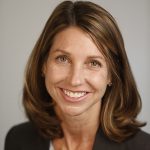
Dr. Zissimopoulos is a Professor in the Sol Price School of Public Policy at the University of Southern California (USC) and co-director of the Aging and Cognition Program at the Schaeffer Center for Health Policy & Economics. She is Principal Investigator of the NIH-funded Resource Center for Minority Aging Research (RCMAR) focused on Alzheimer’s disease and other dementias, Principal Investigator of the NIA-funded Center for Advancing Sociodemographic and Economic Study of Alzheimer’s Disease and Related Dementias (CeASES-ADRD). Dr. Zissimopoulos has trained 45 junior scientists, including 11 assistant professors, 17 postdoctoral fellows, and 17 predoctoral fellows. Dr. Zissimopoulos will assist in the training activities for this grant.
VPD 412H, University Park Campus, Los Angeles CA 90089-3333
(213) 821-7947